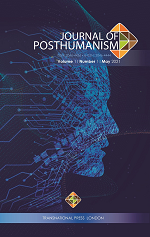Journal of Posthumanism invites contributors to the inaugural issue of the Journal of Posthumanism, an international peer-reviewed scholarly journal promoting innovative work to transverse the fields ranging from social sciences, humanities, and arts to medicine and STEM.
Submission Deadline: 22 January 2021, Friday
We invite contributors to the inaugural issue of the Journal of Posthumanism, an international peer-reviewed scholarly journal promoting innovative work to transverse the fields ranging from social sciences, humanities, and arts to medicine and STEM. In line with the efforts of creating a broad network beyond disciplinary boundaries, the journal seeks to explore what it means to be human in this technologically-saturated, ecologically damaged world, and transcend the traditional conception of the human while encouraging philosophical thinking beyond humanism. With its post-centralized (un)structure, it aims to open up new possibilities in reconfiguring the integral and dynamic multi-scalar relationality between the human and more-than-human world, the clear-cut boundaries of which are eroding. Perceiving the human in critical enmeshment with the more-than-human world, thus, the journal aims to deconstruct the long-held but ineffectual hierarchical divide between various species, different ethnic groups, cultures, sexualities, genders, and worlds, and reflect the embodiment of their interwoven differences. It also places significant emphasis on the breakthroughs in biomedicine, biotechnology, bioengineering, and computer technologies, including humanoid robots and AI, stem cell technologies, gen-design/editing technologies, reproduction technology, artificial gametes, synthetic drugs, artificial organ transplantation, plastic surgery, body modification and augmentation, xenotransplantation, and animality. All of these technologies change how we understand and interpret the world and help us re-describe the posthuman condition we are living in. The journal additionally responds to the impacts of these developments on various landscapes, dimensions, environments, climates, life forms, and biodiversity. The journal is interested in enriching dialogue among scholars, academics, practitioners, policymakers, and students working in/with numerous different fields and in encouraging the posthumanist ethos and praxis.
We invite papers, commentaries, interviews, book reviews, and artistic works investigating the posthuman condition in its diverse modes of being and knowing. The proposed call is open, but contributions may explore the following themes:
Possible topics are not limited to:
- Posthuman philosophy
- Posthuman criticism
- Posthuman theories, methods, approaches
- Posthumanism(s) and new materialism(s)
- Posthuman literature
- Posthuman mind, consciousness, and memory
- Posthuman bioethics/ethics
- Posthuman bodies
- Posthuman subjectivities and identities
- Posthuman, nonhuman, inanimate
- Posthuman (bio)politics, (bio)power, and security
- Posthuman science and medicine
- Posthumanism, Illness and Eco-Sickness (plague, epidemic and COVID 19-pandemic)
- Posthuman SF (science fiction, speculative fiction and fantasy)
- Posthuman cosmologies: Universes, paraverses, and multiverses
- Posthuman and transhuman worldbuildings
- Posthuman feminism or feminist posthumanism
- Posthuman gender/sex, queer, transgender
- Environmental posthumanities
- Posthumanism(s), political economy, and political ecology
- Posthumanism(s) and Anthropocene/Capitalocene/Ecocene/Plantationocene/Chthulucene
- Posthuman gaming, social media, visual media
- Posthumanism and plastic surgery
- Posthuman technologies, STEM, and Artificial Intelligence (AI)<
- Posthuman (digital) aesthetics
- Posthuman aesthetics and all forms of arts
- Posthuman design and architecture
All submissions should follow the latest guidelines of APA style referencing. You are welcome to submit full-length papers (5000-6000 words), commentaries (1000-2000 words), book reviews, interviews, and artistic works.
Please direct any queries about the journal to posthumanism@tplondon.com
About the Journal

ISSN 2634-3576 (Print) | ISSN 2634-3584 (Online)
https://journals.tplondon.com/jp/announcement/view/6
Published by Transnational Press London | tplondon.com
Journal of Posthumanism is an international multilingual peer-reviewed scholarly journal promoting innovative work to transverse the fields ranging from social sciences, humanities, and arts to medicine and STEM. In line with the efforts of creating a broad network beyond disciplinary boundaries, the journal seeks to explore what it means to be human in this technologically-saturated, ecologically damaged world, and transcend the traditional conception of the human while encouraging philosophical thinking beyond humanism.
With its post-centralized (un)structure, it aims to open up new possibilities in reconfiguring the integral and dynamic multi-scalar relationality between the human and more-than-human world, the clear-cut boundaries of which are eroding. Perceiving the human in critical enmeshment with the more-than-human world, thus, the journal aims to deconstruct the long-held but ineffectual hierarchical divide between various species, different ethnic groups, cultures, sexualities, genders, and worlds, and reflect the embodiment of their interwoven differences. It also places significant emphasis on the breakthroughs in biomedicine, biotechnology, bioengineering, and computer technologies, including humanoid robots and AI, stem cell technologies, gen-design/editing technologies, reproduction technology, artificial gametes, synthetic drugs, artificial organ transplantation, plastic surgery, body modification and augmentation, xenotransplantation, and animality. All of these technologies change how we understand and interpret the world and help us re-describe the posthuman condition we are living in.
The journal additionally responds to the impacts of these developments on various landscapes, dimensions, environments, climates, life forms, and biodiversity. The journal is interested in enriching dialogue among scholars, academics, practitioners, policymakers, and students working in/with numerous different fields and in encouraging the posthumanist ethos and praxis.